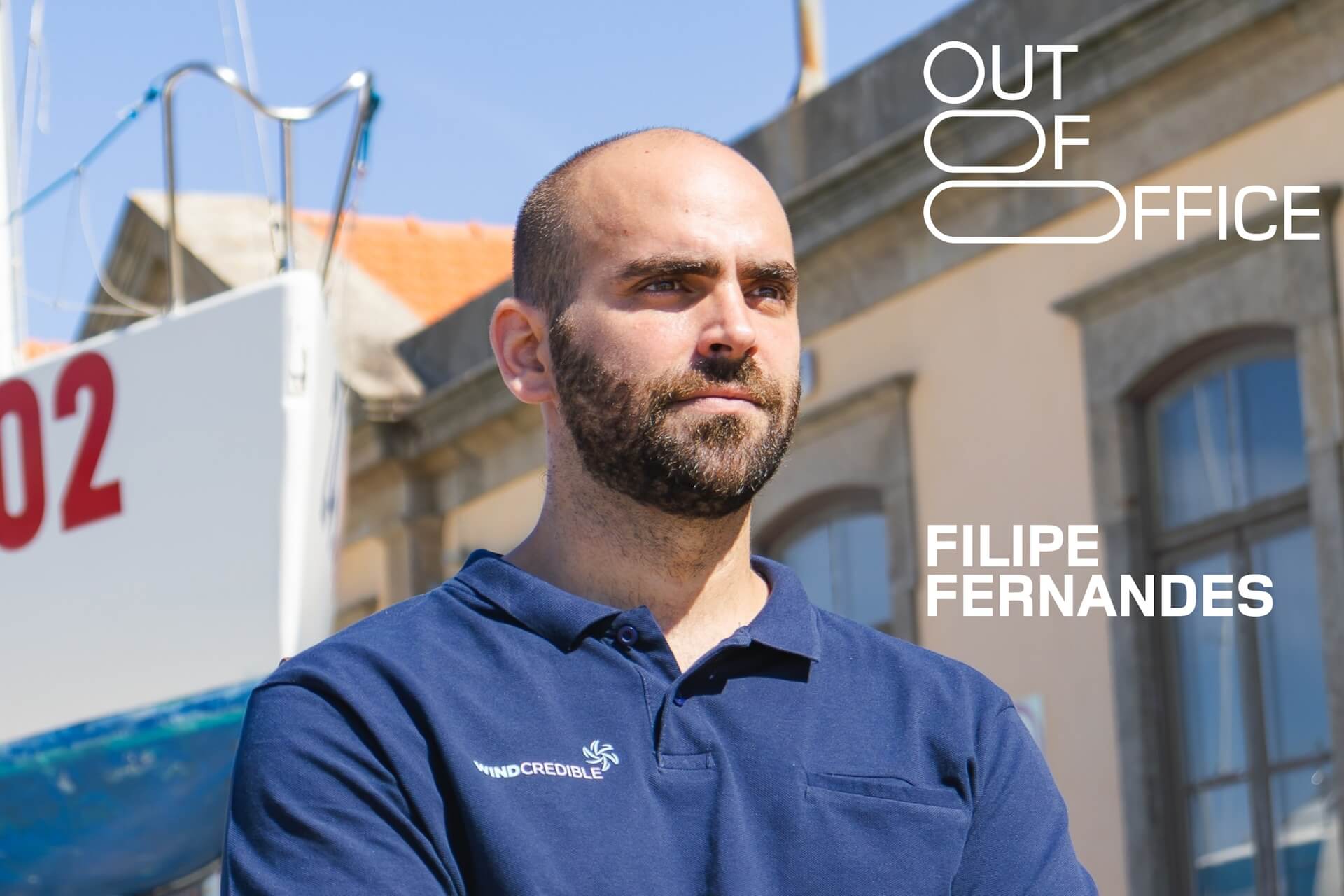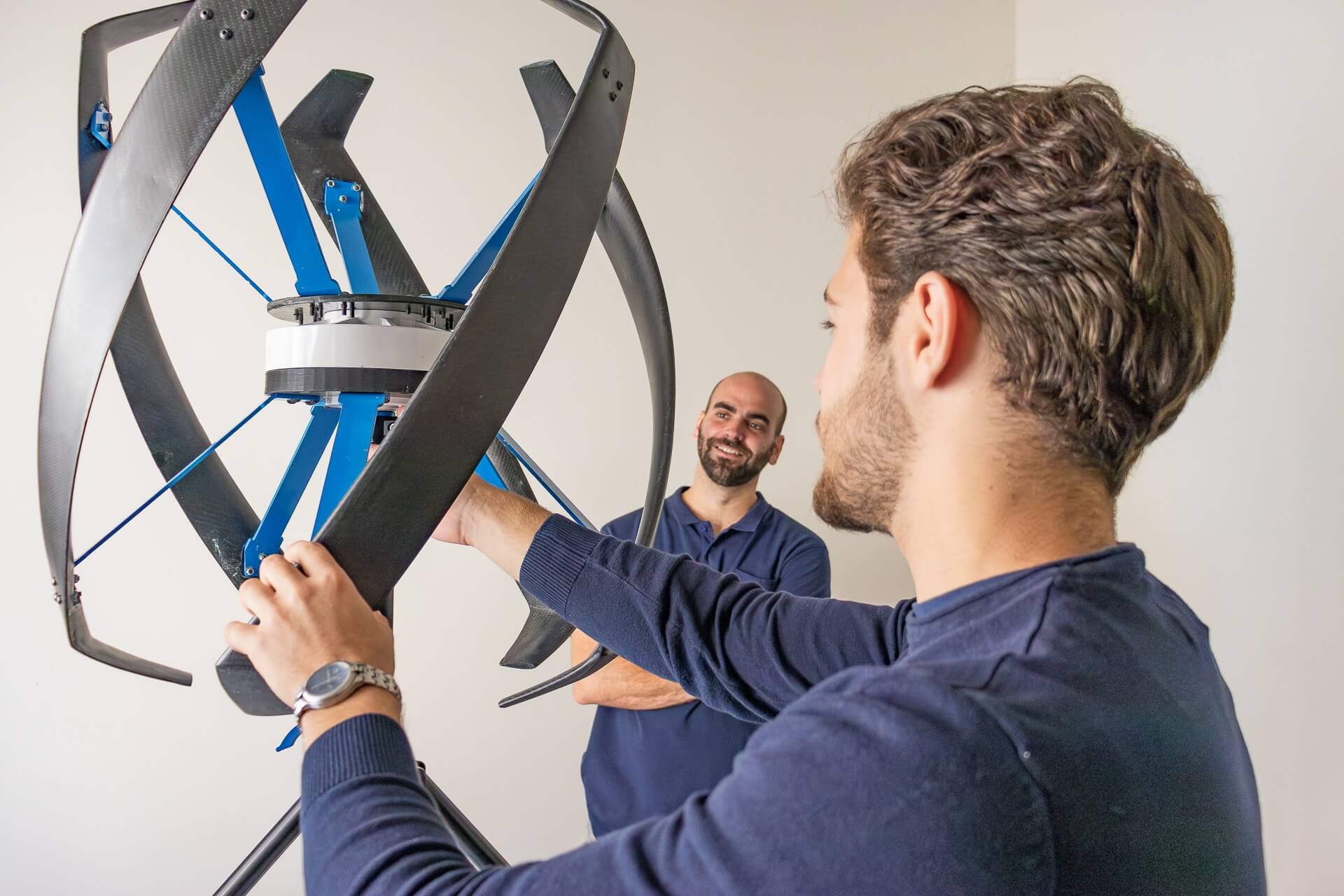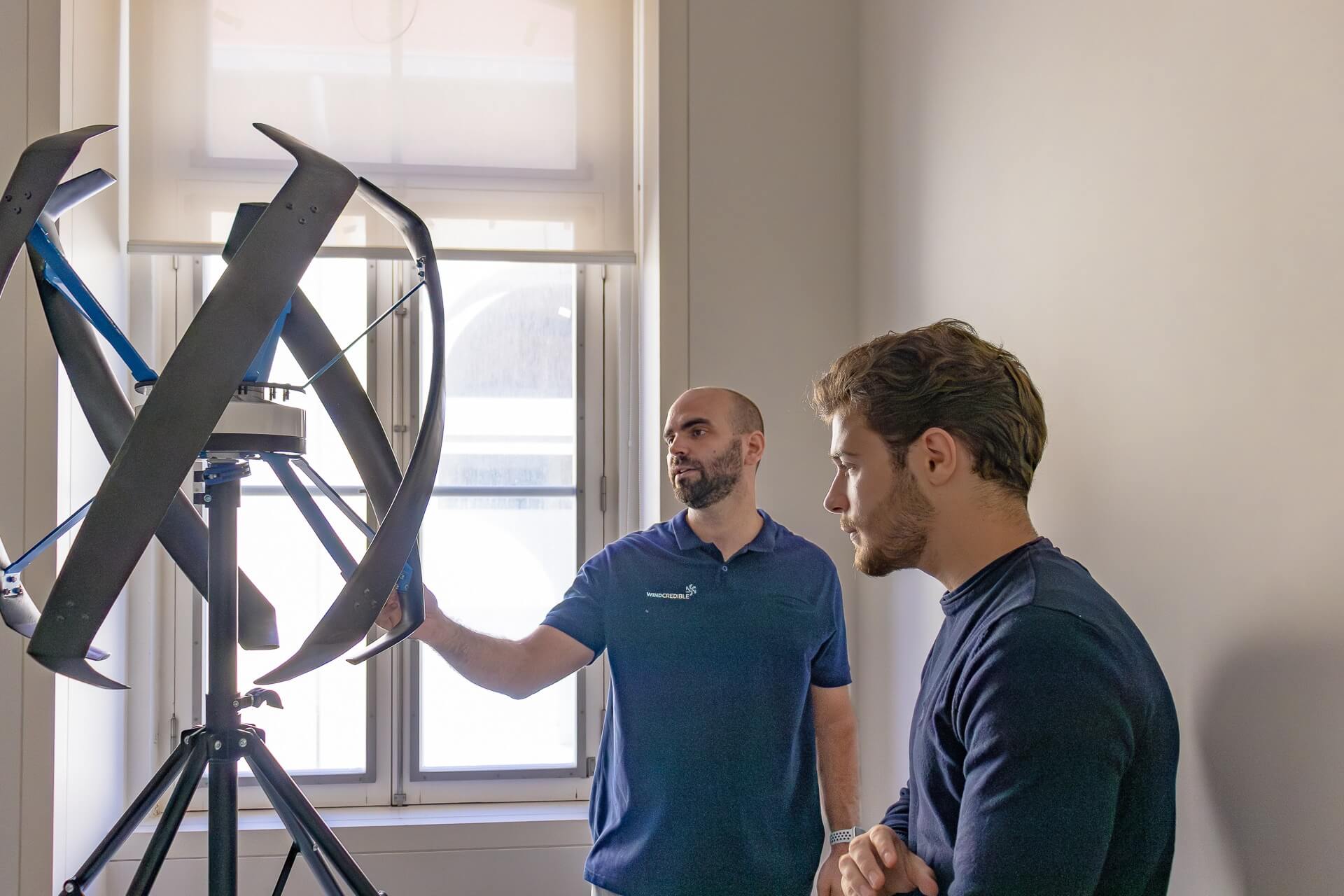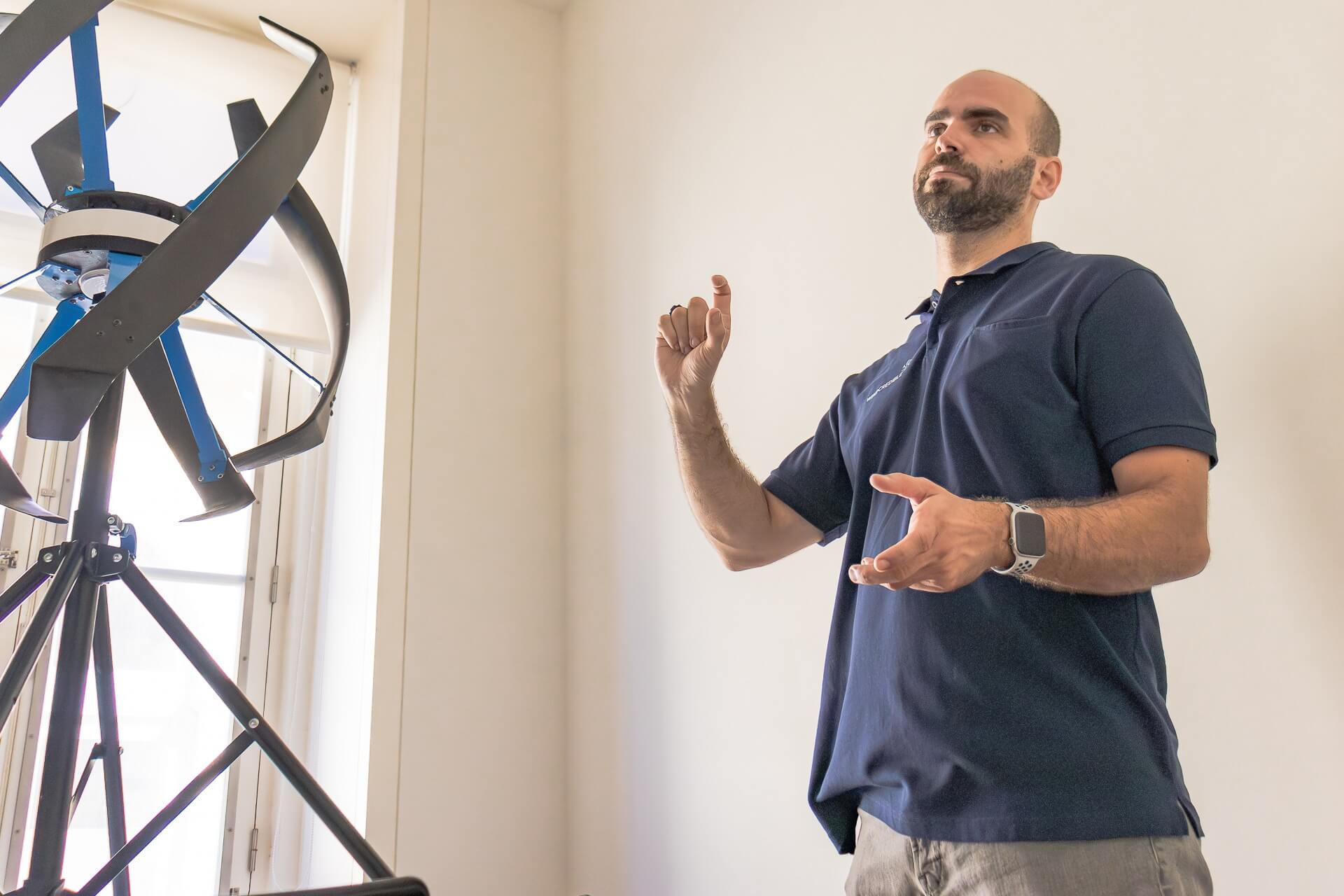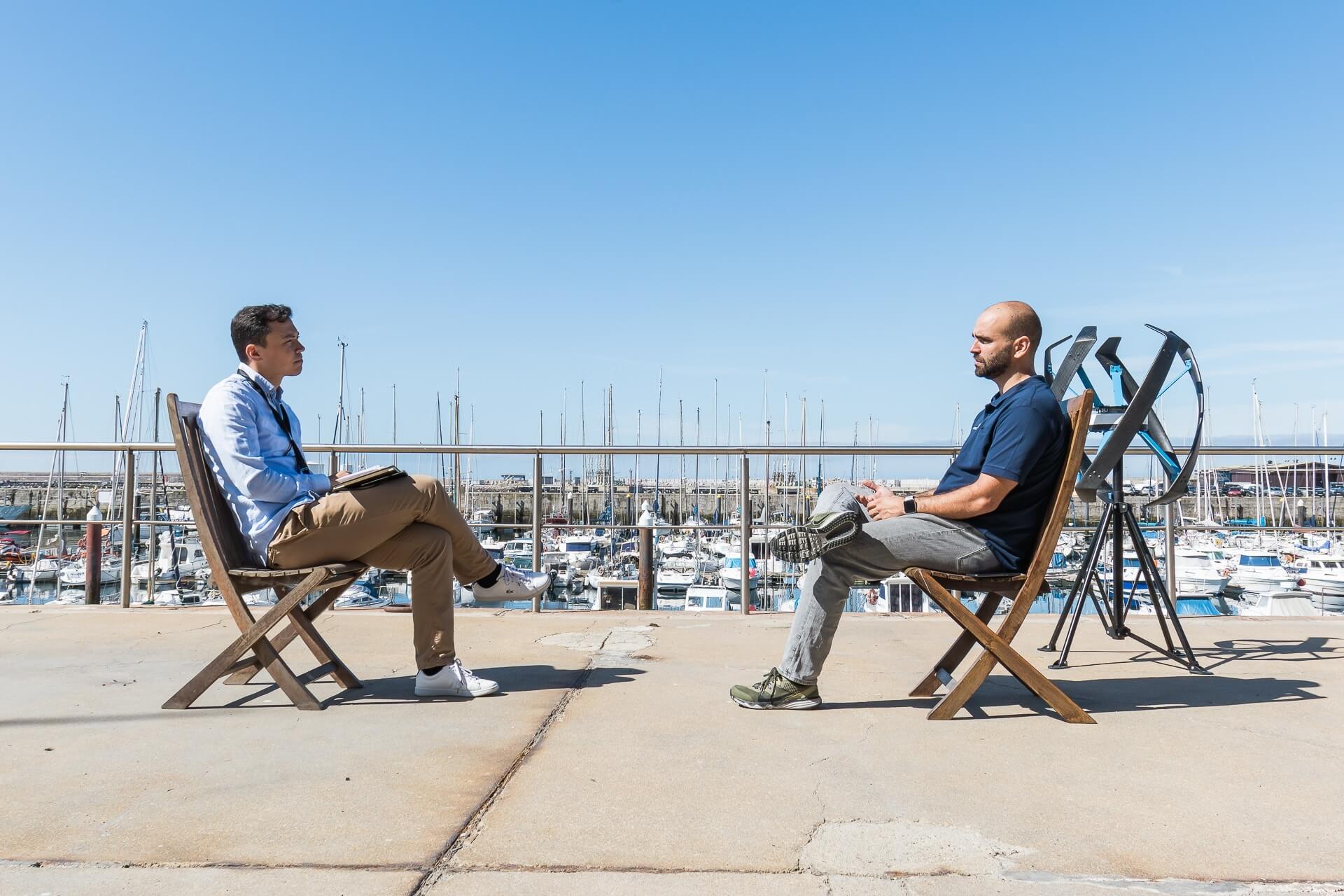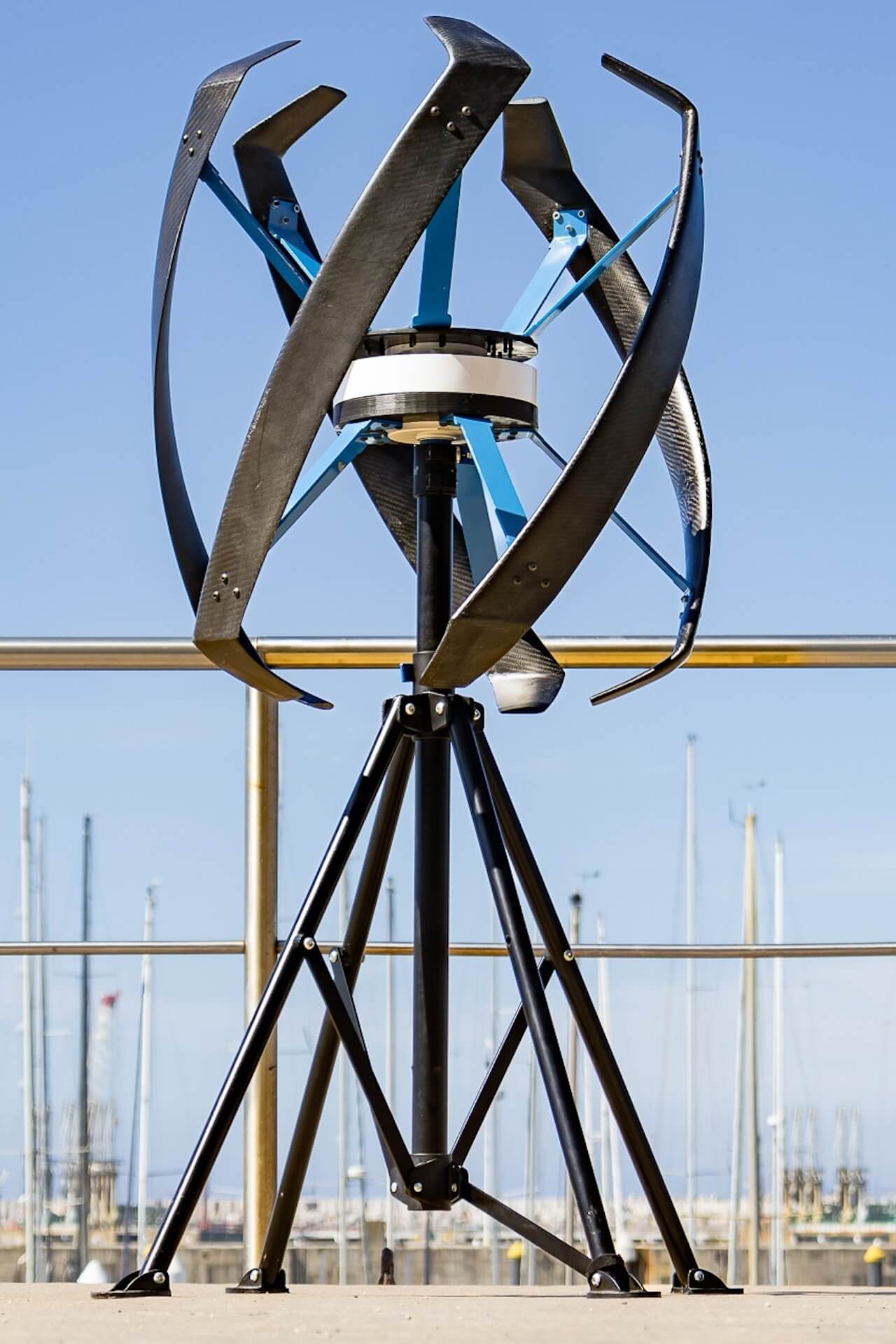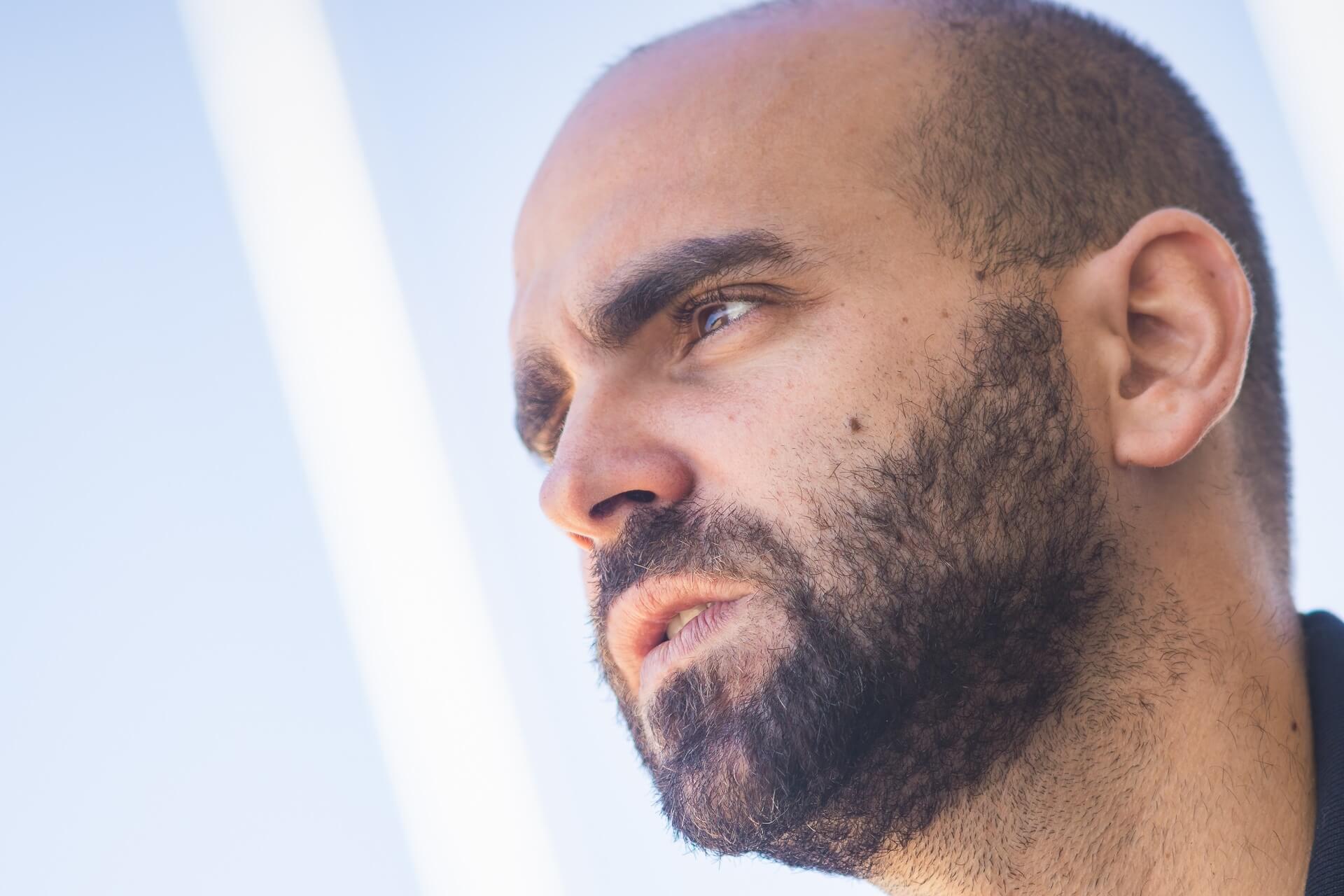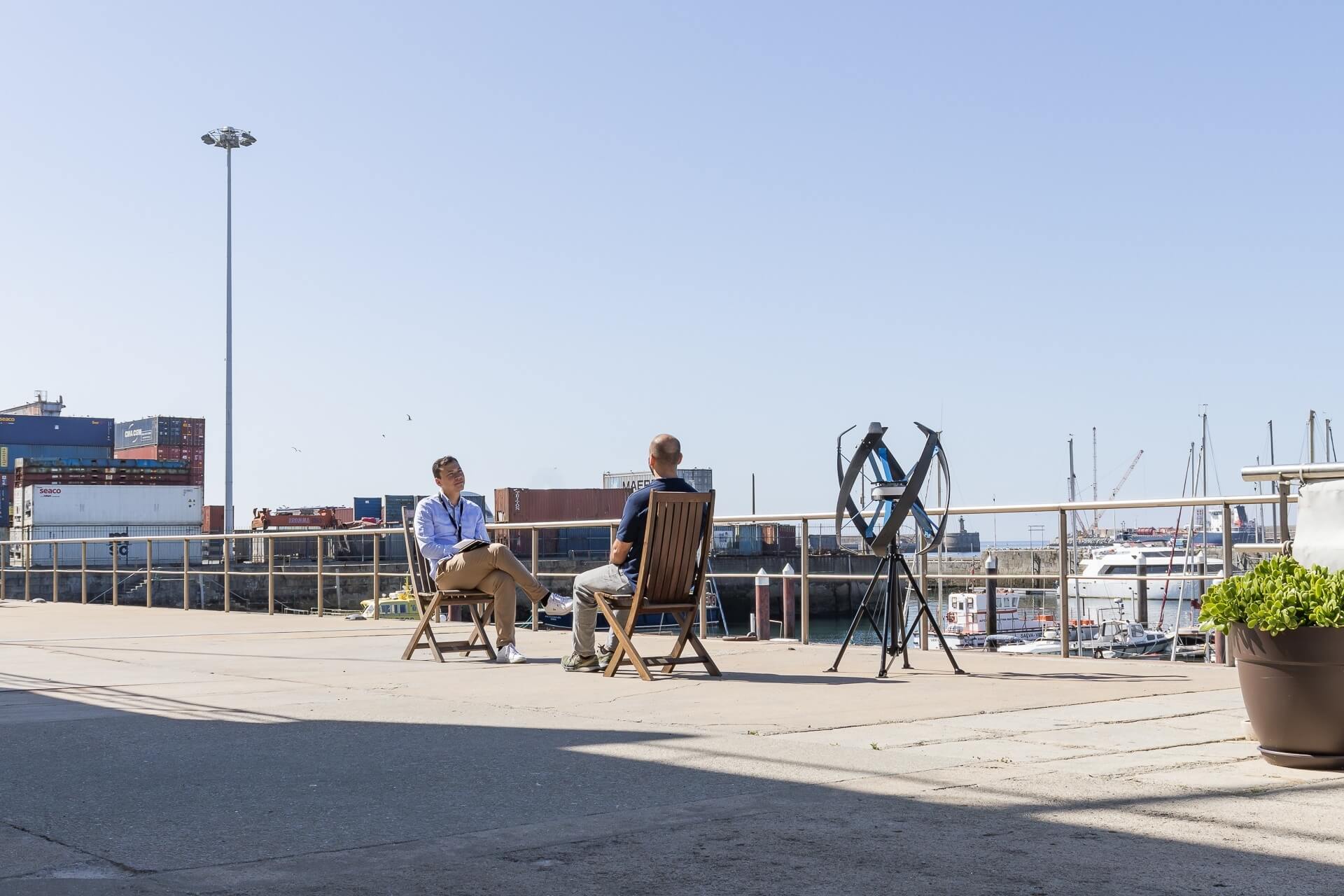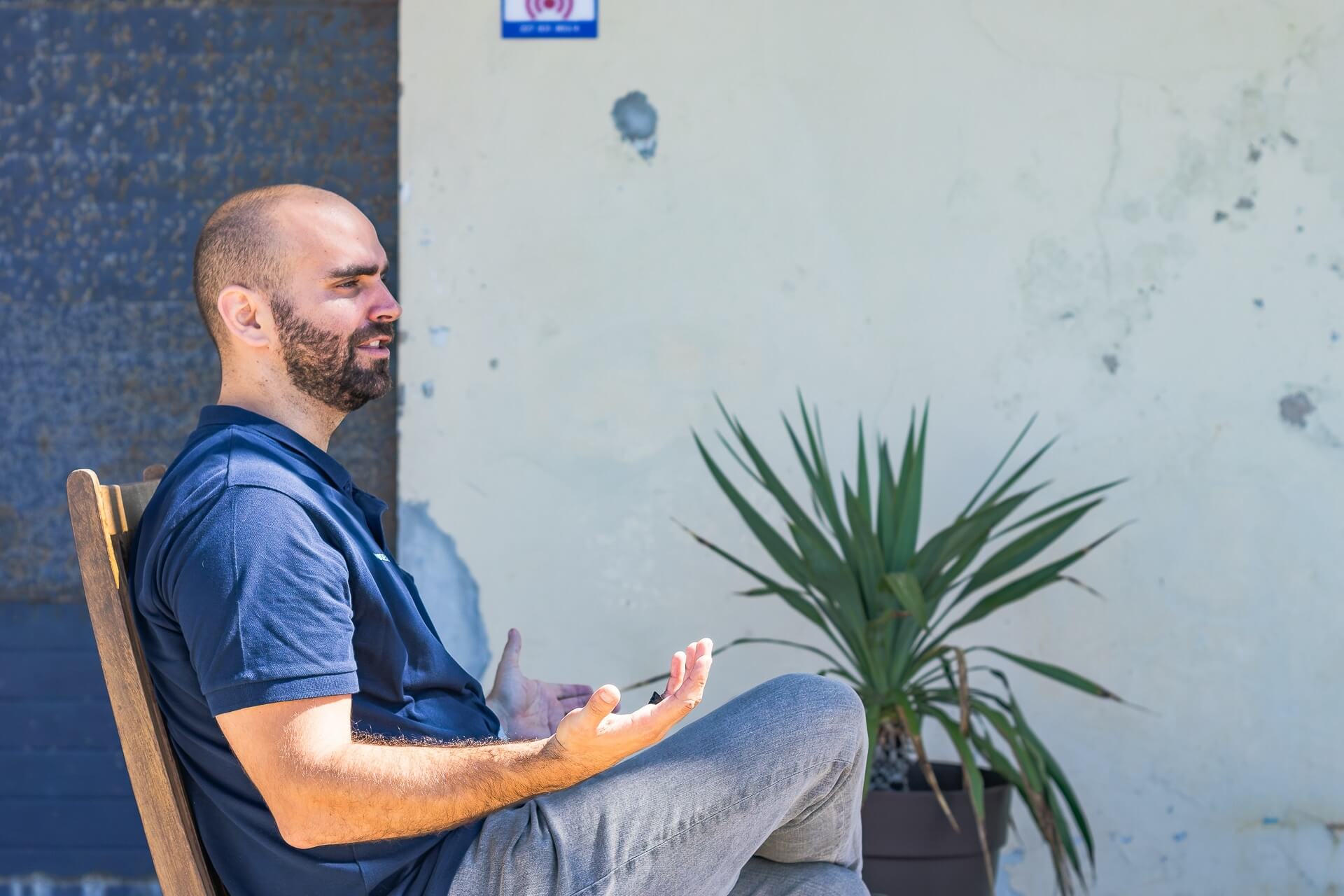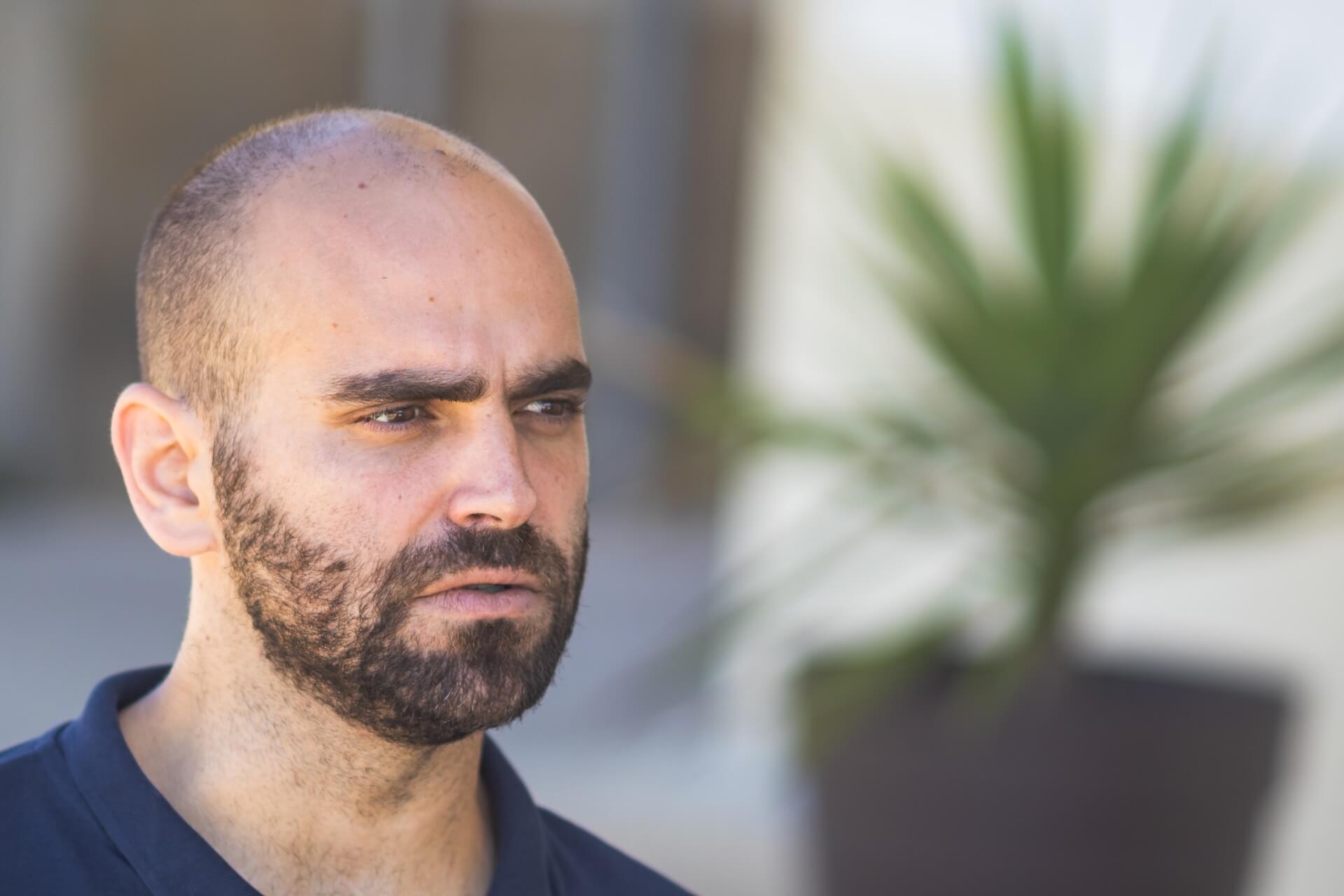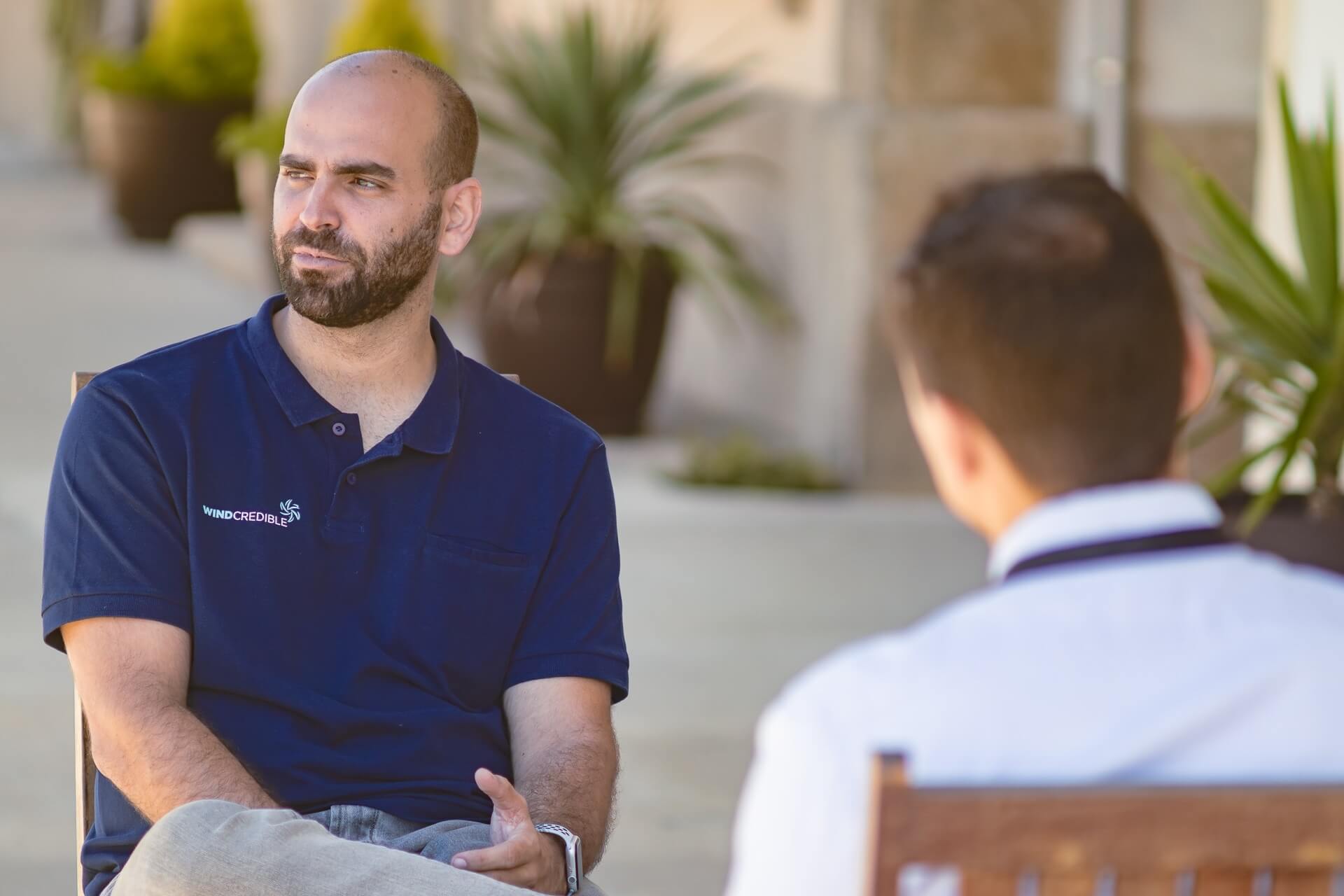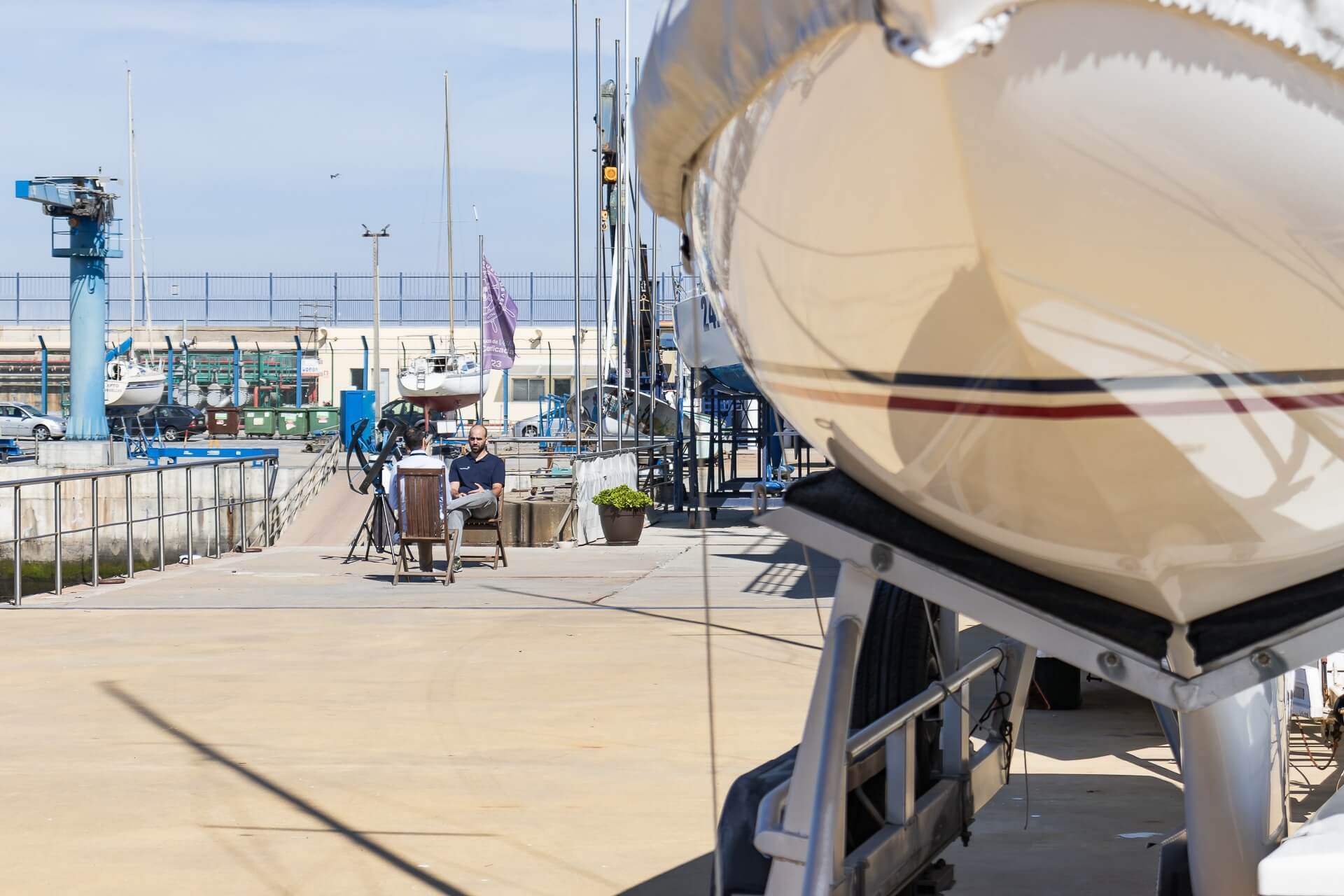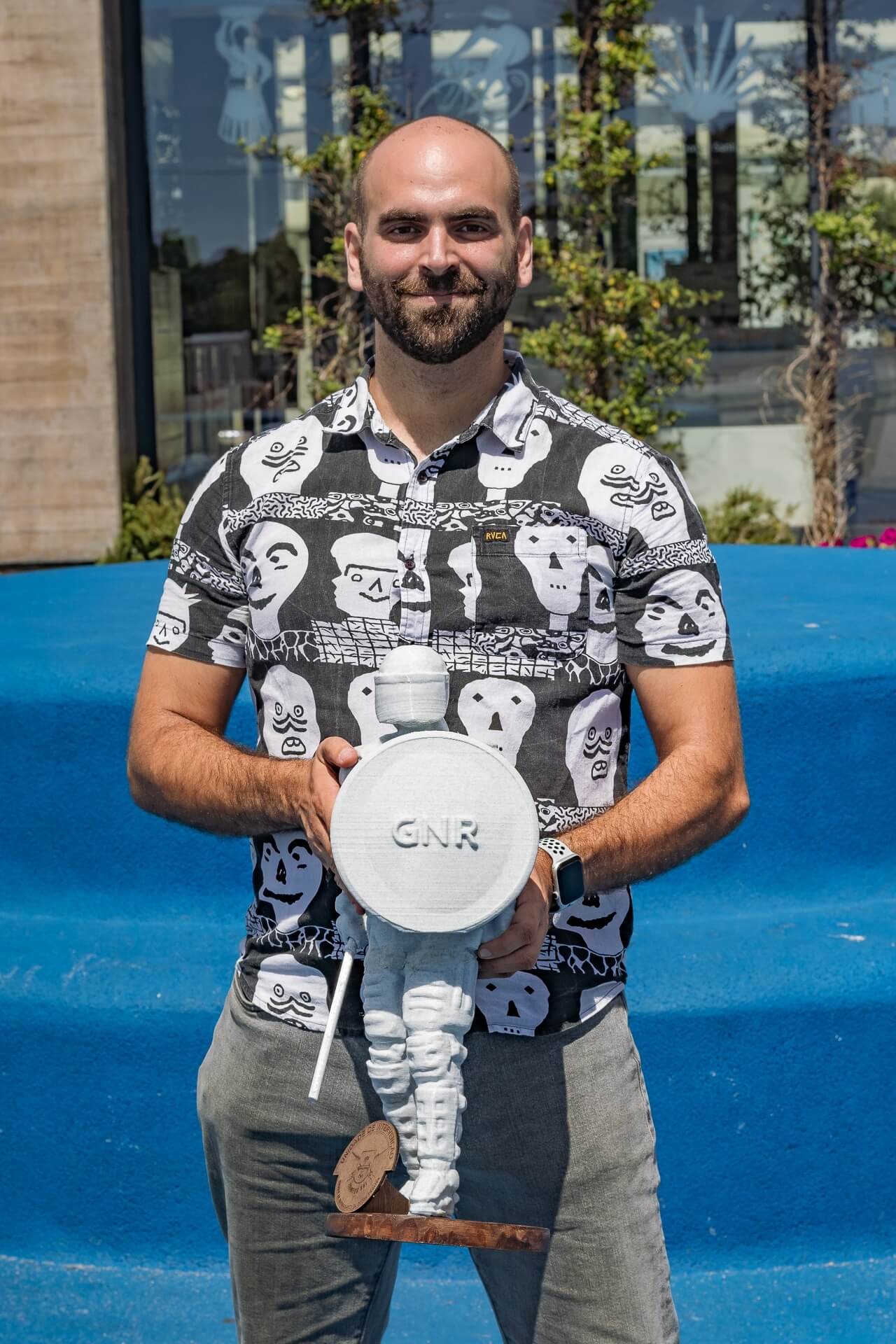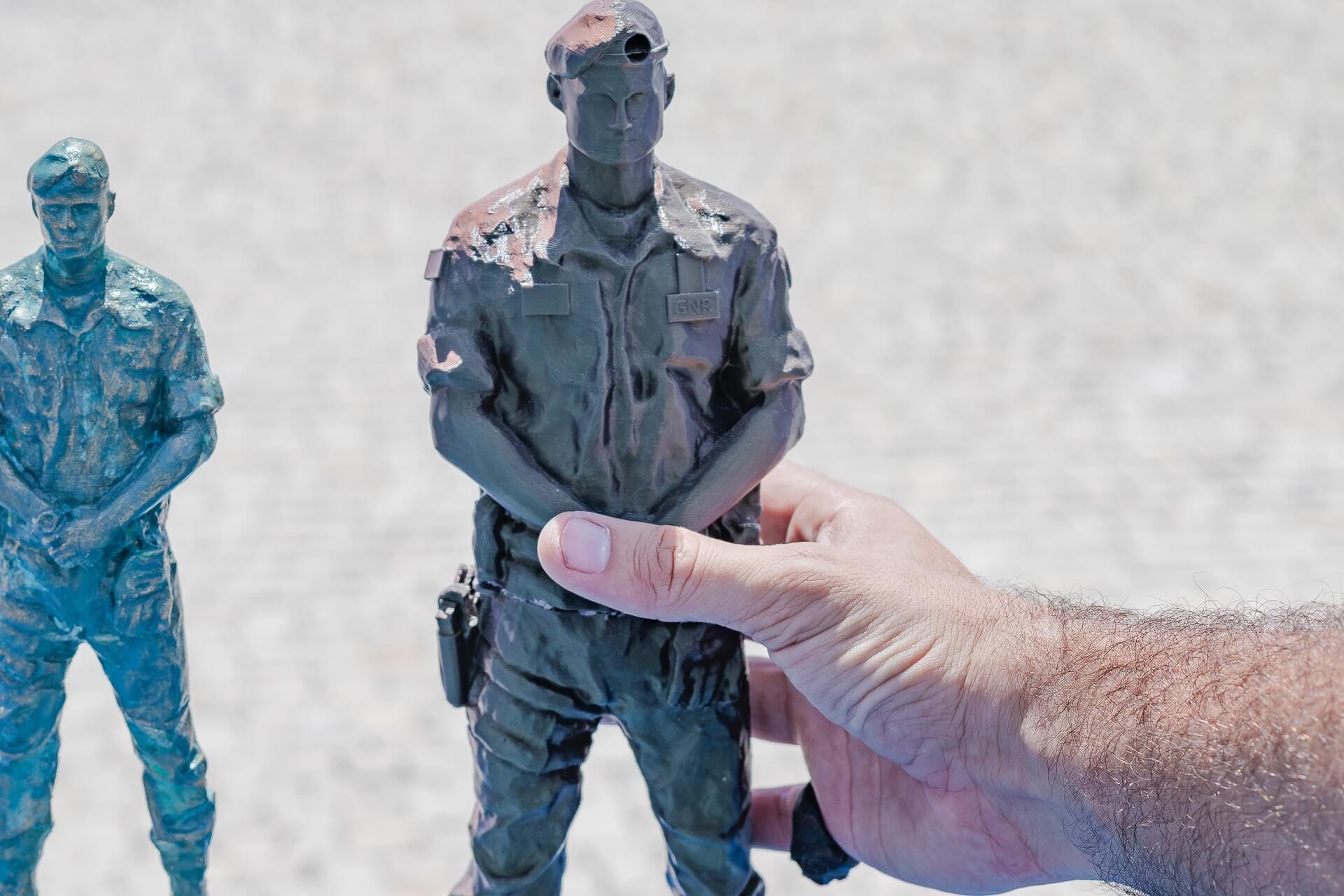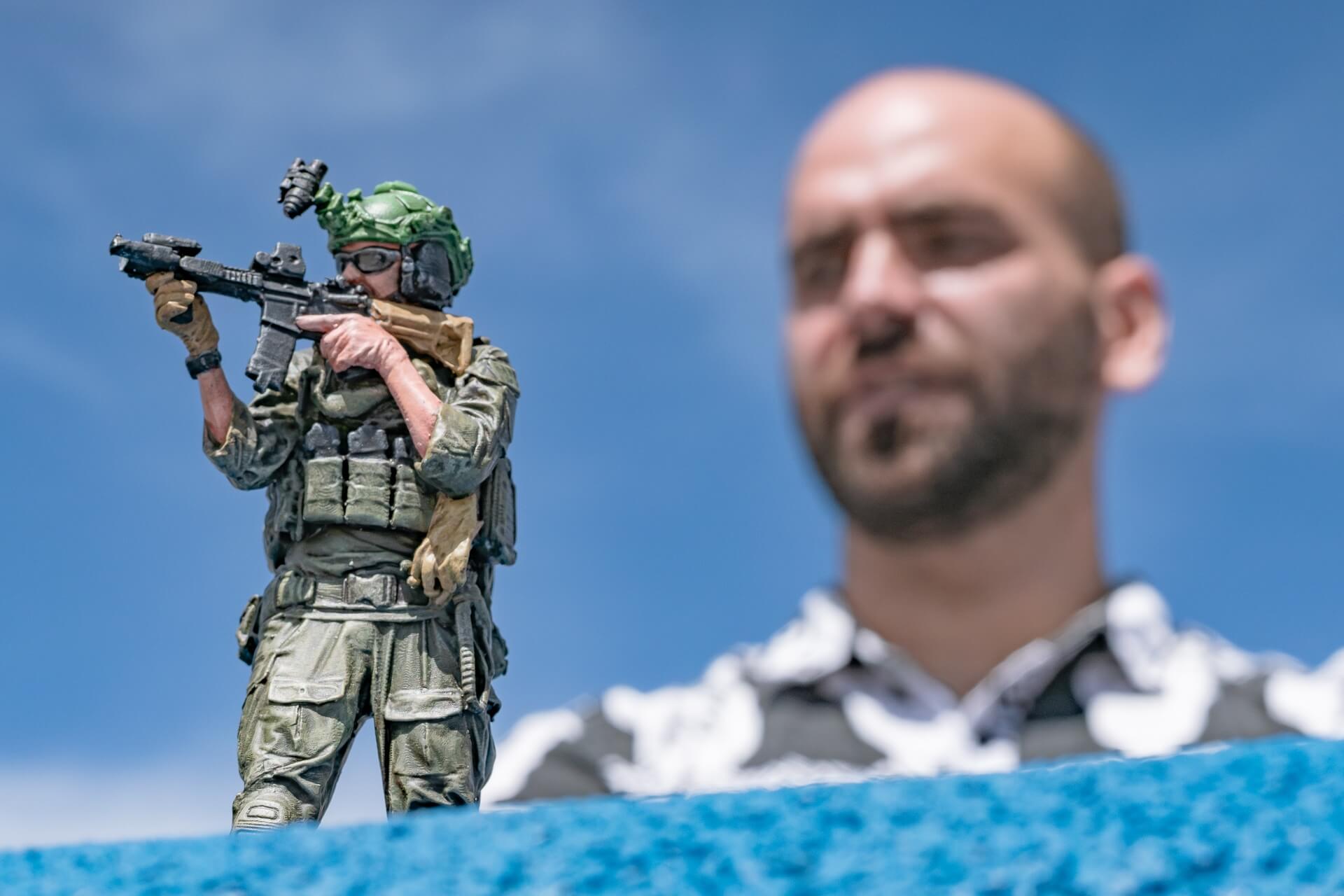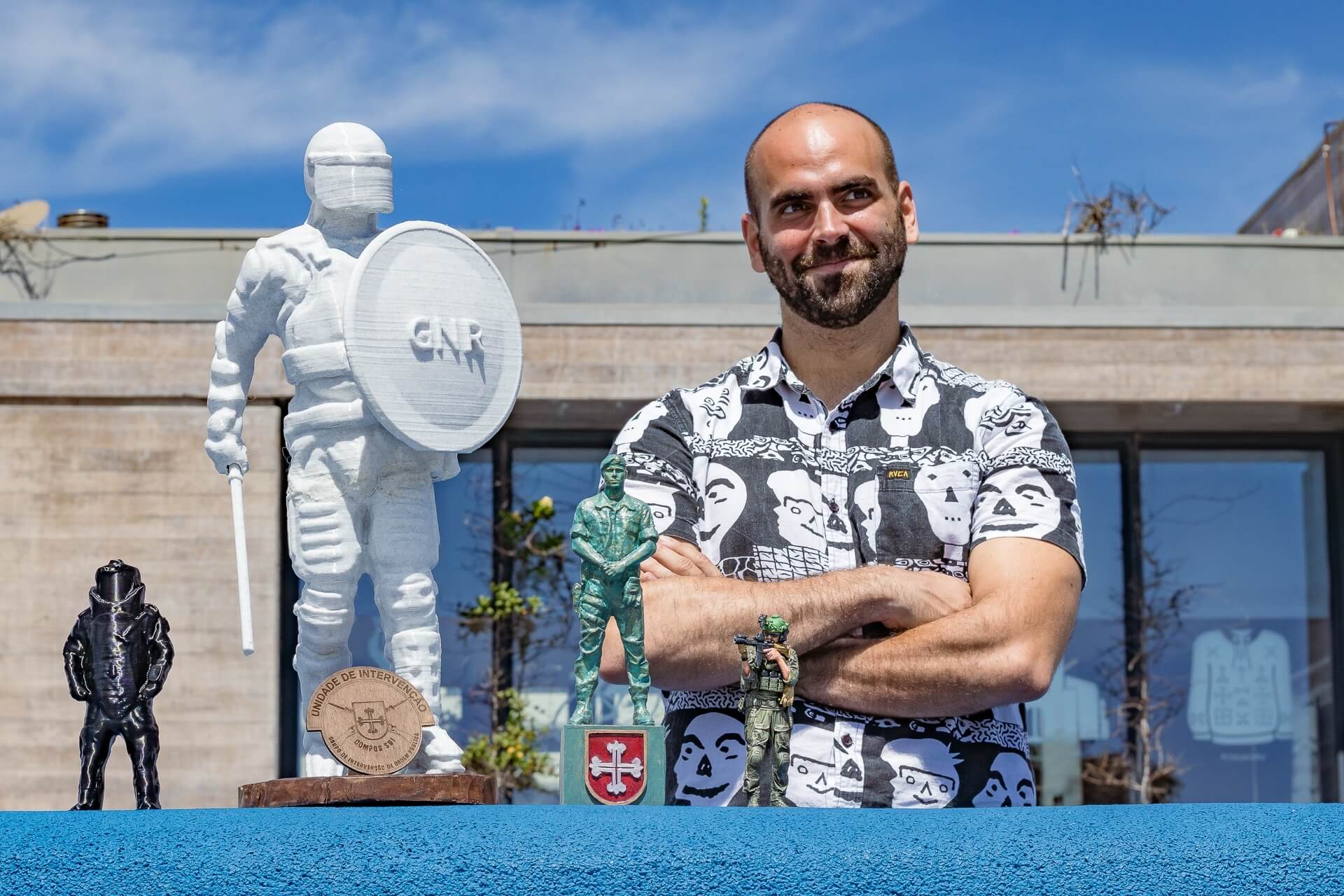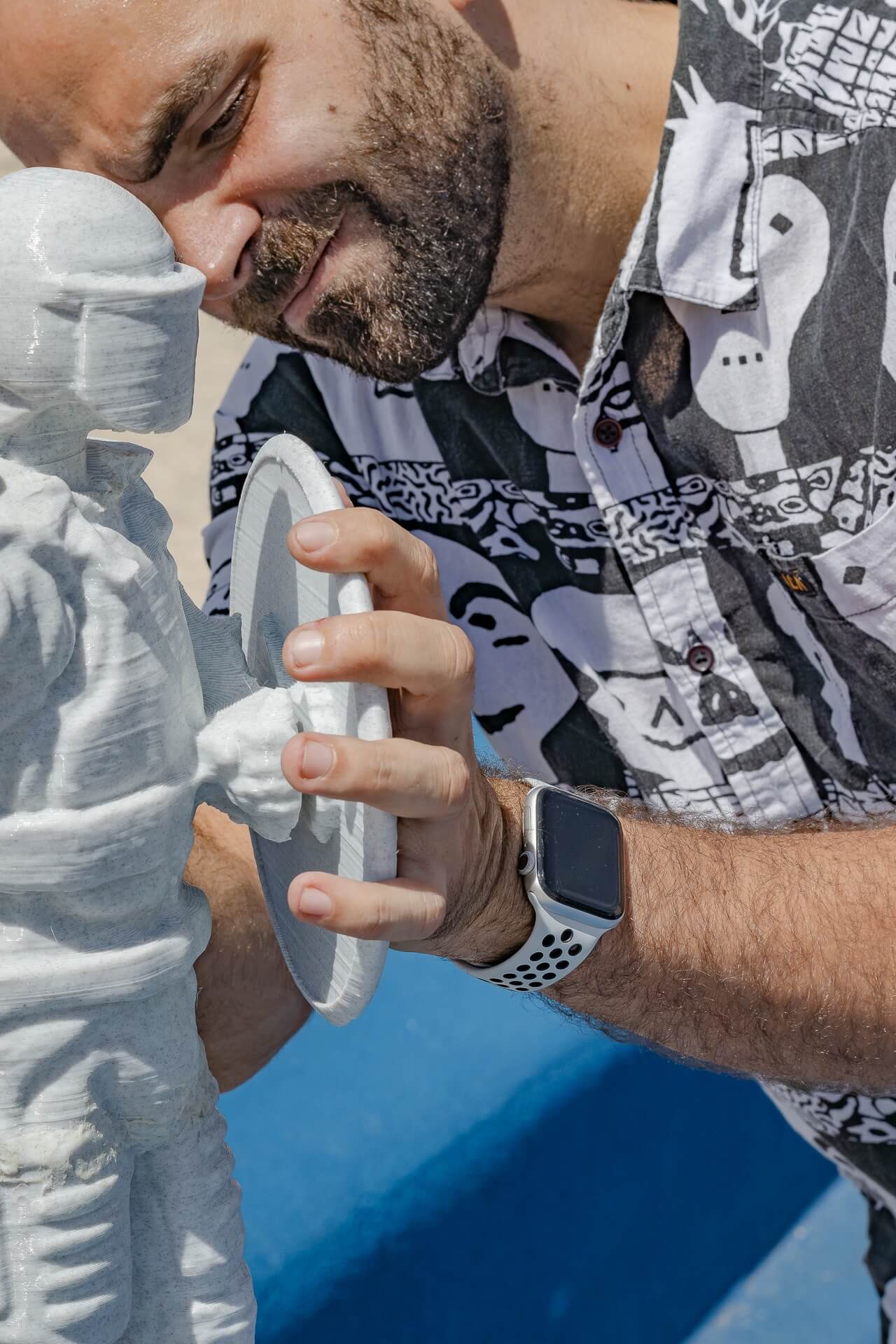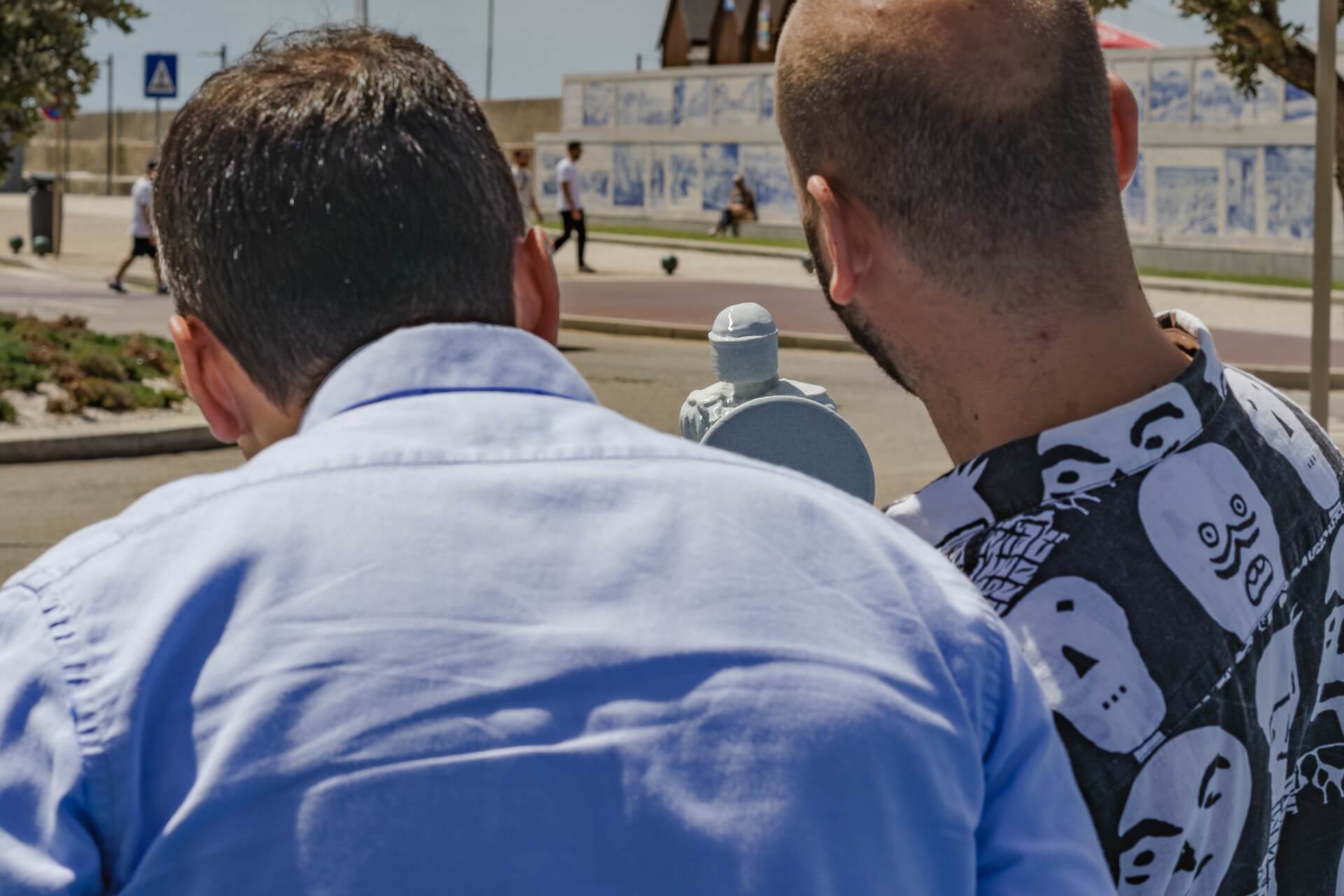Filipe Fernandes: “We want to have a turbine on every roof, so our bar is high”
Filipe Fernandes: “We want to have a turbine on every roof, so our bar is high”
At Out of Office this month, we spoke with Filipe Fernandes, 33 years old, founder and CEO of Windcredible, a project that has gone from strength to strength since its creation. The life of an entrepreneur mixed with his military career, that took on incredible shapes in the last few months, which led him to make a tough decision. From financing to marriage, from the dusty wind to the impact of his grandfather, read here the story of the boy who always wanted to own a factory and has 3D printing as one of his main hobbies.
What is Windcredible?
It is a Portuguese startup with the mission of developing an efficient wind turbine with the most significant number of applications possible, which helps people have another sustainable solution. Our product aims to reduce the scale of current wind energy to a scale that is closer to families and companies and which they can themselves install in their homes and buildings, yet another way of producing clean green energy with a minimum ecological footprint, especially because current wind energy solutions end up having some negative points.
Such as, for example, the end of life of materials. Is this a big concern for your solution?
Yes, because the end of life of technology is sometimes overlooked. For a period of time, the blades that produce wind energy do their job. Still, when they reach the end of their life, around 20 years later, they end up being very difficult, or almost impossible, at least for now, to be recycled. , and this is a dilemma that wind companies are dealing with. With our solution, this problem does not exist because of its smaller size and how it is made, using recycled materials, such as organic fibres and biodegradable resins.
How does your turbine work?
Our first product is turbines, and when we talk about them, we refer to the general aspect of the system. The turbine is what makes it move. It is the moving part of the system that, inherently having Nelson on the team, we already have full knowledge of the process. The turbine and the blades were developed during Nelson’s doctoral thesis, and when we invited him to the company, it was with the aim of him also bringing this significant capital, this intellectual property, and working on this. We have already submitted a provisional patent application, an area where we are evolving, and it works by transforming wind energy into electrical energy, that is, kinetic energy into electrical energy, and it does this with a magnetic induction process. Inside the generator, there are permanent magnets; in this case, they are powerful neodymium magnets, which, when passing through the copper windings, make an oscillation that allows the production of energy.
And how did you meet Nelson?
Nelson’s arrival led to a significant change in our company. The idea came up with me, with António, and the first steps we took as a product were with Marvim. Our initial idea, which has not been forgotten, was to use engines from electric mobility vehicles, whether from scooters, bicycles, or motorbikes, in which the engine can be reused in a second life; as a generator, the technology is reversible, and the goal was to start there. During our research, when I was designing and making the first prototypes, the first thing to do was investigate what exists, so it was pretty exciting work. Looking at patents, works, submissions, and articles, I found a researcher who alone filled two pages of research case, and there was a name in common in all of them: Nelson Batista. Firstly, it was essential to have a point of relationship. I think this story is also interesting because when we looked for Nelson in some research, we tried to find him, who this person is, and I realized that he worked in the same company as Mafalda, my wife. So she introduced us, I presented the project, our objectives, and where we wanted to get to, we invited him to join, and he accepted.
A fundamental step for you?
Undoubtedly. Nelson is one of our founders. He actually had this idea and started developing this technology much earlier than us because, in this aspect, Nelson is a complete visionary. If we see the work he has developed, he is very much on the crest of the wave, from IoT, blockchain and semi-autonomous systems, so it was great to meet Nelson because I know he knows what I want to do. This first component of the turbine is the first piece of the puzzle that we want to build in an integrated system with more capabilities than those we are used to and expect from a turbine, but all of it benefits the end consumer.
At this moment, Windcredible is made up of how many elements?
It was founded by four elements. Me as CEO, Nelson Batista as CTO, António Santos as COO, and Marvim as CPO. From the moment we form the team, this is the core. We have other people who are helping us, initially part-time, but as we receive investment, as we have sales, the objective is also to grow the team to respond to our needs.
How did you meet Marvim?
So Marvim, our CPO, I met him when I had a few days… Marvim is my father (laughs), so our relationship has been going on for a long time. He was the one who introduced me to a taste for many of the things that are bearing fruit today. My father is a mechanical engineer, and my mother is a mathematics teacher, so I always had a lot of good incentives to discover, research and ask; it’s essential to ask, and that introduced me to the taste of playing with Legos and other mechanical models. I think this exercise, from a very young age, gives us the ability to think about more complex systems and interact, integrating with more complicated things.
And António?
Our COO, António Santos, was also a military man. He was my soldier for the last year and a half, although I’ve known him since I joined the Intervention Unit. He is a broadcast soldier in the Transmission Section, headed by the Command and Services Company. I commanded a public order platoon from 2013 to 2018 when I joined the Unit. In 2018, I left due to my promotion to captain and returned to the Academy to teach. I returned to the GNR, spent six months at the Information Center, and then I was forced, so to speak, to spend my time. I chose the Unit, and António continued there in his role. Being a company commander, I started to interact with him much more regularly; with very similar tastes and ways of thinking, I think we complement each other quite well. I’m more reserved, calm and analytical, and he’s hugely affable, so I know I have someone to break the ice and who helps me greatly because that’s one of my shortcomings. He also liked the project, and we started in the barracks, creating the first drawings. Still, as the idea matured, we found a space, our space, in Damaia, very close to Cova da Moura, where António is from. I think that, at this stage, these four pieces are very complementary. We are still very focused on the product itself. We already have exciting advances with potential customers, but we still don’t have the infrastructure, per se, to scale. At this stage, our primary focus is to put the product on the street, and as the need arises, we begin to increase the company’s size.
The objective is to reach half a million Euros in investment
Where does your name come from?
The name came to me during a race, and it was something I was looking for. Initially, we had a name dedicated to our history, Vento Luso. Still, we wanted to convey, right from the start, that we were open to the world. We wanted an understandable name, not only by the Portuguese but also at an international level. Then came the combination of the words Wind, wind, and the word incredible, which is also our purpose: that this equipment is really different from what exists on the market and that it brings benefits.
What is the primary motivation for creating Windcredible?
There are a lot of people who complain and few who do it. We were going through the time of COVID-19 and being impacted by this climate trauma, in which our existence is being called into question, and the answer is not appearing. And Mafalda was feeling that a lot. And me too. The question is: can we confront the situation and continue? We can make some changes at our level, and they are actually tiny at our scale, but if everyone does it, at scale, it will bring considerable gains, or else what I thought was creating something that doesn’t exist. It’s not a silver bullet; it’s not the only solution, but it’s one of the components of the solution, and that was very motivating because standing still and seeing all this happening causes a lot of anxiety, so I feel useful. I know I am developing something with great potential, which also helps me. It is necessary, which does not exist, so we need to combine these two gaps, and we will be successful.
And how did your connection to UPTEC come about?
It was through ClimateLaunchpad. It was the first time we put the idea on paper. In fact, I thought it was amusing; in the competition, it was said, “Even if the idea is on a napkin, put it out there” even more so, in a competition, I think it’s an excellent motivator to force you to develop. They give you goals, objectives, and a lot of training, too, and things evolve from there. We know UPTEC as the host of ClimateLaunchPad; the team that was most connected with us was Raphael Stanzani and Francisca Eiriz. We became national winners, we were in the top three. We went to the European final, where we reached the wild card, as we were one of the teams with the best performance, and we went to the global semi-final, where we ended up. One of the prizes for the winning teams is an incubation period, the gateway. Through UPTEC, we also compete with Portugal Ventures, with whom we have already closed a deal and are being invested by them. The participation of BornFromKnowledge (BfK) from the National Innovation Agency (ANI) was an excellent opportunity for us to work on our idea; we have incentives for this, therefore, the relationship with UPTEC is excellent.
Tell me about your participation in the Web Summit. Was it an essential step on your path?
Last year, we had the opportunity to participate in the Road To Web Summit. It was an excellent opportunity which allowed us access to the Web Summit fair, and it was thanks to preparation and homework done in advance to make the most of this opportunity. It was three very intense days, so when we had the stall, on the last day, it was from eight in the morning to seven in the afternoon, something like that, without stopping for lunch (laughs). It went very well; many people were interested in our technology, they liked us, and we also received the award for best performance at the Web Summit. Anyone who has the chance to participate should do so because it is an outstanding school; what we learned there is transversal to other events, and we want to return this year. Things are heading towards that.
In recent months, they have won and participated in a series of programs: TechStars, InnovationEDP, PrioJumpStart, Clean Future, BluAct, and Triggers.
It was a result of our initial strategy. Not having the product or having a relatively limited capacity to execute the product, which is quite demanding in terms of capital, we advanced in what we could do, not only the customer search part but also the investors. We are looking for customers to validate our idea and validate interest in the company and the product, and then investors to make initial prototypes viable so that, from there, we could leverage the product with customers. I looked for opportunities in the ecosystem, and we applied for several initiatives. The main criteria were to be linked to sustainability, potential partnerships with clients connected to our activity, and the component of advice, mentoring and investment.
Can you highlight any?
I highlight the TechStars programme because it has an investment component that enabled the full-time work of the founders and initial prototypes. It also gave us access to a very varied, different and complementary network of mentors, which really has people of value and still accompanies us today. The remaining programs were all exciting. It took us a lot of time, and the time has to come from somewhere. Still, in the end, we reaped the rewards, and as we have the product, we will materialize or close all the businesses that started and are in progress.
How much investment have they already raised?
In terms of closed investment, we have Techstars, which is financing our activities, and we have two more financings in line; we are finalizing the details, so to speak. In total, there is €300,000 of convertible debt, and the expectation is, at the beginning of next year, the second tranche of this amount from our pre-seed. The objective is to reach half a million euros in investment. Along this journey, we believe that the product will evolve, guaranteed. We want to have a turbine on every roof so our bar is high, but we have to start somewhere.
What has been Windcredible's main achievement so far?
TechStars’ investment. It is also a crucial factor in the company’s development; therefore, it made it possible to have full-time partners, and it is only from there that things really accelerate. The initial investment allowed us to not only move this prototype forward but also have a forecast of when it will be operational and then networking. We have weekly conversations with potential investors, which is very satisfying, knowing that there is interest and this access to investors allows for better risk management.
And some less favourable moment?
The least favourable moment was when I was accumulating, doing both jobs. I had my job as captain of the GNR, and then I had my job at Windcredible. There are two full-time jobs. At that time, I was under more pressure and was quite overwhelmed. TechStars’ investment made it possible to put a brake on one of the projects, and that makes a big difference, even on a personal level. Life can’t be all about work, and we have a family to care for, so we also have to take good stock of that.
What is the best and worst thing about having this responsibility as a CEO?
The best thing is to have a vision and, step by step, make it happen. Building things is natural for humans; building things gives pleasure in seeing work done. That’s what makes it most worthwhile, seeing our idea go to the computer, leave the computer, and go into the real world; that’s fantastic. The worst part is the responsibility. In terms of people management, it was never a problem for me. I was always in charge of a team, and the viability of salaries was never my concern, as I knew, from the outset, that the salary was guaranteed. With this leap, things changed a little paradigm, and what I now do has direct implications for me, the founders and their families, and the collaborators that may come. My main concern is this: ensuring that this is viable, that it has a future, and that the sustainability of the company and the people who work there is guaranteed.
Next steps for Windcredible? Continue your investment here in Portugal or think abroad?
Soon, the concern will be the product and, therefore, the installation of our first prototypes. We aim for ten prototypes, ten pilots with companies in Portugal, some Portuguese, others international. Still, at least we have ten products to produce to measure the efficiency, vibrations, and noise they may produce and start collecting data. The first step is to install this equipment, study its operation for six months to a year, continue product development at the turbine level, start the development of other components, and during the next year, we will already have some internal production capacity of the models, we will probably start with the smallest, start producing ourselves, we will also learn the production method, while we continue, and will continue, to use a supplier. In the long term, reaching the market with a finished product by 2025 and then having production capacity closer to industrial, that is, with a production of a considerable number of turbines per year, which the objective is to have by the end of 2025, one megawatt of installed capacity. It is ambitious on our scale if we compare it with the scale of the auctions that are taking place, which go up to 3.1 gigawatts, so it is a different order of magnitude.
Whether in the role of son, grandson, husband, soldier, student, or athlete, Filipe Fernandes' life has always had several layers, but it is in three dimensions that he likes to express himself most. The hobby of 3D printing occupies our interviewee's free time, and his commitment to this art is visible to all.
I think the wind component has always been very connected with me
Where and what were your early years like?
Born and raised in Póvoa de Varzim. I have always been very connected to the sea. When I was younger, I did sailing and swimming, so I think the wind component was always very close to me because Póvoa is very windy, and I had to have an idea linked to that. Childhood spent here, adolescence too, divided between here and Vila do Conde. I practised many sports, from basketball, sailing, golf, MMA (Mixed Martial Arts). I’ve always liked asking questions and enjoyed learning; I think it’s one of the things that really makes me who I am and makes me tick when I’m learning and doing new things. After high school, in 2008, I became a man, packed my bags, headed to Lisbon, to Amadora in particular, and entered the Military Academy. At the time, I had also applied to Universidade Nova de Lisboa, where I enrolled in Biomedical Engineering. I received this news when I was already at the Academy and was left with my desire to have a military career.
What was Filipe like as a student? Is it the same as an entrepreneur and a professional?
The Academy went quite well for me; in the first year, in terms of qualifications, I was second best, and I finished the five-year course in fourth place. I apply myself a lot to the things I really like, and the things I don’t like usually don’t go well (laughs). My luck is that I liked practically everything in the course I was on, so I was pretty motivated, and I also feel that now. Lots of challenges, lots of learning. The qualifications that we pass on and develop in military life are transferred, with some ease, to the civilian and business world. Team management, public speaking, quick and accurate decisions, and stress management are things that, naturally, were developed.
When did you feel that you had this potential for innovation and being innovative?
Since I was little (laughs). I’ve always liked inventing, drawing, having a notebook, and playing games. The Legos and kits we had really stimulated these areas. It is fascinating to do psycho-technical tests. They’re not always right, but they gave me some ideas of what I was most capable of, which I’m trying to explore. One was the ability to manage Virtual Space, 3D, three-dimensionality, and logic. Starting when I was small helped a lot, and now I’ve reached a level of maturity, of experience, of knowing what I’m worth and can do, which made me change my path. Military life has many challenges; it is very demanding and gratifying. The spirit of camaraderie that is experienced and developed is very significant, but the innovation component, at times, fell a little short. It caused me a lot of confusion when I asked why something was a certain way, and someone said, “It’s always been done that way”, and that messed with me. I tried to change, and there was some resistance, and things ended up falling into place, but there was a natural resistance to change. A startup company is diametrically the opposite and is also very healthy. The objective is also to grow personally and gain new experiences. Everything points to going well, but then, there is always that risk of going wrong. But at this point in maturity, a person thinks, “I don’t have children yet, things are going well. Well, I think I have the fingers to play this guitar, let’s do it.”
And was GNR something you always wanted?
Since I was little, I really liked the military component, the weapons, and the uniform. I was very happy playing airsoft, so I always had that connection; despite not having military personnel in my family, I always saw a military career as a possibility, and I’m glad I chose it. In the past, the military was mandatory, but it is no longer required, and some of the things that I felt in myself and that I saw in other people developing are perhaps greatly missed in society. If the ideal is for everyone to have a military background, I believe that is not the case. If it is the best system, I also think that it is not; mechanisms should be found so that what was transmitted does not stop being shared because these tools are needed by everyone.
How long were you at GNR?
Since 2008, 15 years.
I divorce GNR and marry Mafalda
There can't be many entrepreneurs who share this double life.
It depends a little on the role; some careers allow for a more fixed life. Some responsibilities have different schedules depending on where we are, our position, and the patent level, making the entrepreneurship part unfeasible. Some people manage to reconcile; for officers it is pretty complicated, it is not normal, and perhaps that is why they denied me the accumulation of duties. In this case, I would have to complete 10 years after finishing the Academy, I had about six months left, and since I couldn’t accumulate, I had to leave the company, therefore, the step was, in this case, to favour the company over GNR, and from August, I handed over the badge, and from now on, I am 100% dedicated to Windcredible. It’s an enormous weight off my shoulders, even on a personal level; I know exactly what will happen from now on, at least in the next two years, and it also makes me feel more relaxed.
A difficult decision, I believe.
It wasn’t a decision taken lightly, that’s for sure. A lot is hanging in the balance. The main things are always safety and predictability. Anyone who works in public administration knows that, from the outset, if you are a professional, the expectation of having a job remains. It only depends on us when we take the leap and open the company. Then, it depends on support incentives and financing, so risk is the main factor that differs between the two worlds. Typically, reward is associated with risk. From the outset, I know the prospect of career progression if I had continued at GNR, but I don’t know where I would end up in the company, but, in terms of potential, they are considerably different.
It is with this belief that you made this decision.
It was also a factor. Now that we have investment, we have responsibilities to shareholders and investors. Being out of the company full-time for another six months would clearly have consequences for the company. It would delay the company’s development even further. At this point, we need to speed up (laughs), so my continuation in the GNR was quite counterproductive. Upon leaving the workforce and not completing the six months, I would have the possibility of having an unlimited license to make the decision I made. I would postpone the decision, but I would also have a safety net so I wouldn’t be completely lost if things don’t go well.
August was one of significant changes, a goodbye to one part of your life and a hello to another.
It’s true; I divorced GNR and married Mafalda, all in two days (laughs). It’s a significant step and a lot of thought, but I believe I found the right person. It has already given me a lot of proof, and I think that, without her, I would not be where I am today. It’s also one of the ways to recognize this, and what motivated me was precisely that. We complement each other, and I didn’t want to lose that. There were several factors; she always supported me in all decisions and is one of the main motivating factors for change.
Having discovered this hobbie was also a step to being where i am
And in your free time, what do you like to do?
I’ve always had the habit of training. I like running and going to the gym, I did it every day at GNR. I am considerably less so now, but I hope to maintain some healthier habits and routines. At this stage, I’m not able to reconcile everything. I mainly like learning. In my free time, I like to learn, read, and continue my training. After the Academy, I earned a master’s degree in Information Security and Law in Cyberspace, and a Postgraduate degree in Digital Product Management, so learning is guaranteed to be a hobby. About two years ago, I discovered my taste for 3D printing. It’s a hobby that arrived a little later, but I think it’s a tool that is changing the world and will change even more. Incredibly, we think about an object, draw an object, and create its structure, all in three dimensions, and after an hour, six hours, or a day, that object will appear in front of you. You can make highly complex drawings; it doesn’t matter, the model comes out. And I think it was also an excellent unblocker for Windcredible. The disc at the top and bottom is printed, but the blades are also printed and then covered in carbon fibre. Discovering this hobby was also a step towards being where I am. There are such incredible things that you can do, from reproducing an object, scanning it, and then printing it, miniatures, so it’s really cool to work with a 3D printer.
And how did that come about?
It was with a friend, so I’ve always heard a lot about 3D printers. The limitation is your imagination, ability to draw, the materials, and the printer, but it unlocks a lot.
And what do you usually print?
Professionally, models and parts of prototypes. Not only the blades but also the connections; studying the best way to fit them is often used for prototyping. In my free time, I do things for home, for friends, functional things, more decorative things. I printed, for example, the souvenirs for our wedding, so it’s whatever we want.
Have you ever thought about doing business with it?
It has crossed my mind, and I still sell some things. Still, it was never from that perspective, mainly because what I am producing is a hobby, not on a professional level. If you want to sell something, you must also have quality, and I know I’m not there yet. And then because I also lack some tools, for example, the painting part, it’s essential if I wanted to sell something. I didn’t have the time or patience to learn, so I like learning, but learning everything is impossible (laughs). You have to choose some things… But I accept orders, if you want to order something, I think it can be done (laughs).
Are these moments important to you, considering such a busy life?
I usually have these more meditative moments while running; it’s an excellent way to get my ideas back and forth. I have a defect, which is that I switch off very little. A person closes their eyes, but the problems are there; the brain is working and scheming and thinking about things, which also has wear and tear and implications. When I was working both jobs, it was double that, so it was even more complicated. Running, swimming, and at the gym is the ideal time to think about things but not stress; it is a different response to the process.
In your personal life, do you believe that marriage will be the most positive point in your life so far?
It will be a very positive point, but it will not change much. We’ve been together for several years; we had the entire COVID period together, each year of COVID-19 means about ten years of traditional marriage, so we’re almost at our silver wedding anniversary (laughs). I don’t think much will change.
Who was the person who has impacted you the most so far?
I think my parents. They put a lot of effort into educating me and my brother. I think they achieved this, they transmitted many values that currently make a difference, and I recognize that what they gave me at the time, 30 years ago, is still up to date. I feel like I had a lot of support when I was younger, which had implications for my future. They were the people who always supported me. Going to the Academy surprised them, and now, this choice in favour of entrepreneurship was more difficult for them to understand. I understand that they only have my best interests at heart, but they had some doubts, it’s normal. They gave a lot of advice to consider, to slow down, that concern remains, but they were, without a doubt, the people who impacted me the most.
What is most indispensable for you in life?
The most important thing is to be happy and feel good about ourselves. One of the things I like most is having time. Having time to do nothing is one of the things we have less and less of, but it’s one of the things that feels best.
And where do you see yourself in five years?
In five years, I see myself at Windcredible, possibly in another country, or at least with relationships and an internationalized product, but I hope to be cruising at speed. I hope to have the factory set up in five years, with production capacity, lots of sales, and the company growing more and more.
And how do you see the world in five years?
The world in five years is difficult to predict. Nobody predicted that there would be a war in Europe, and it happened. Several factors here are coming together, and are not very positive, from the rise in inflation, the climate change crisis, where we went from having events that happened once in a century to having events that occur every year. In the short term, I don’t know what implications it will have, but in five years, we will see even more fires, even more droughts, even more hunger. I think this problem will become much more acute in the coming years, and it isn’t easy to provide solutions. It can’t just be the State, it can’t just be companies, some solutions have to come from society. The prospects at a global level are not very good, but we have to continue living our lives and fight for what we have and want.
When i was a kid i liked to say i wanted to have a factory
What is your greatest virtue and your greatest flaw?
In terms of virtue, I think it is the ability to see far away. At the military level, there is a very cool tool: reverse planning, in which we decide on an objective and then plan how to achieve it. This allows us to visualize a path and what we must do to reach that goal, and this ability to unite the two points is my main attraction. Understand trends, carefully analyze the basic principles of a problem, and then arrive at a possible solution. Regarding the main defects, I think it is wanting to think about too many things simultaneously, and clearly, afterwards, some things are left behind. I’m a bit of a monotasker. You may have played Sims; it’s one task at a time because otherwise, things fall apart, and some things get lost (laughs).
Do you have a favorite word?
Maybe saudade (nostalgia), I think that’s the preferred word. It’s a Portuguese word, which sometimes has difficulty being translated internationally; therefore, it’s something a little unique, and it’s a feeling that we still have that feeling at a national level. If we emigrate, we wait our whole lives to return home. If we miss our family, it is a beautiful thing. Longing is more beautiful when it ends, when we stop missing the person, and when we find them, as a rule, these are always good moments.
Any date that is recorded in your memory in a special way?
My marriage, defending my two theses, and entering the Academy were significant changes in my life.
Finally, tell me three things you would like to do in your life.
I really liked flying. One day, when jetpacks were actually working in earnest, I’d like to try it. I’ve jumped out of planes, I’ve done parachuting, both military and civilian, but it’s not the same thing as having the freedom to feel like a bird. And the same for the sea, entering the sea is a very different experience. I would like to have a greater ability to dive and explore the ocean. The third thing was to create my own company. When I was a kid, I liked to say that I wanted to have a factory. My grandfather had a big impact on us. The stories we heard from my grandfather, from everyone in Póvoa, were incredible. Even today, they congratulate my mother for being José Reina’s daughter, and I learned from him the potential of being the boss, of having your own business. He had four children, and three of them had a higher education degree; we are talking about 50 years ago, so it is clear that whoever can do business can give to his family more than he achieved. I think it’s an excellent social elevator lever, and I got a little out of it, in my own way. At the time, clothes were only washed by hand and having a laundry room turned out to be something innovative. A factory for turbines is a little different, but the principle is there. My grandfather was an excellent reference.
